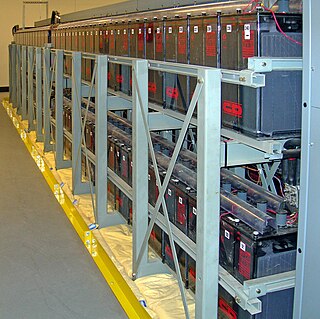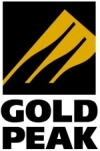
A power tool is a tool that is actuated by an additional power source and mechanism other than the solely manual labor used with hand tools. The most common types of power tools use electric motors. Internal combustion engines and compressed air are also commonly used. Tools directly driven by animal power are not generally considered power tools.

A rechargeable battery, storage battery, or secondary cell, is a type of electrical battery which can be charged, discharged into a load, and recharged many times, as opposed to a disposable or primary battery, which is supplied fully charged and discarded after use. It is composed of one or more electrochemical cells. The term "accumulator" is used as it accumulates and stores energy through a reversible electrochemical reaction. Rechargeable batteries are produced in many different shapes and sizes, ranging from button cells to megawatt systems connected to stabilize an electrical distribution network. Several different combinations of electrode materials and electrolytes are used, including lead–acid, zinc–air, nickel–cadmium (NiCd), nickel–metal hydride (NiMH), lithium-ion (Li-ion), lithium iron phosphate (LiFePO4), and lithium-ion polymer.

Sanyo Electric Co., Ltd. is a Japanese electronics manufacturer founded in 1947 by Toshio Iue, the brother-in-law of Kōnosuke Matsushita, the founder of Panasonic. Iue left Matsushita Electric Industrial to start his own business, acquiring some of its equipment to produce bicycle generator lamps. In 1950, the company was established. Sanyo began to diversify in the 1960s, launching Japan's first spray-type washing machine in 1953. In the 2000s, it was known as one of the 3S along with Sony and Sharp. Sanyo also focused on solar cell and lithium battery businesses. In 1992, it developed the world's first hybrid solar cell, and in 2002, it had a 41% share of the global lithium-ion battery market. In its heyday in 2003, Sanyo had sales of about ¥2.5 trillion. However, it fell into a financial crisis as a result of its huge investment in the semiconductor business. In 2009, Sanyo was acquired by Panasonic, and in 2011, it was fully consolidated into Panasonic and its brand disappeared. The company still exists as a legal entity for the purpose of winding up its affairs.

Bharat Heavy Electricals Limited (BHEL) is an Indian central public sector undertaking and the largest government-owned power generation equipment manufacturer. It is owned by the Government of India, with administrative control by the Ministry of Heavy Industries. Established in 1956 with the help of Soviet technology, BHEL is based in New Delhi.
Cadmium is a naturally occurring toxic metal with common exposure in industrial workplaces, plant soils, and from smoking. Due to its low permissible exposure in humans, overexposure may occur even in situations where trace quantities of cadmium are found. Cadmium is used extensively in electroplating, although the nature of the operation does not generally lead to overexposure. Cadmium is also found in some industrial paints and may represent a hazard when sprayed. Operations involving removal of cadmium paints by scraping or blasting may pose a significant hazard. The primary use of cadmium is in the manufacturing of NiCd rechargeable batteries. The primary source for cadmium is as a byproduct of refining zinc metal. Exposures to cadmium are addressed in specific standards for the general industry, shipyard employment, the construction industry, and the agricultural industry.
Hon Hai Precision Industry Co., Ltd., trading as Hon Hai Technology Group in China and Taiwan and Foxconn internationally, is a Taiwanese multinational electronics contract manufacturer established in 1974 with headquarters in Tucheng, New Taipei City, Taiwan. In 2021, the company's annual revenue reached 6.83 trillion New Taiwan dollars and was ranked 20th in the 2023 Fortune Global 500. It is the world's largest contract manufacturer of electronics. While headquartered in Taiwan, the company earns the majority of its revenue from assets in China and is one of the largest employers worldwide. Terry Gou is the company founder and former chairman.

Eveready Industries India Ltd. (EIIL) is an Indian company that manufactures and markets batteries and lighting products. The Eveready brand has been present in India since 1905. It also manufactures photogravure plates, castings, carbon electrodes and related products.

Electronic waste or e-waste describes discarded electrical or electronic devices. It is also commonly known as waste electrical and electronic equipment (WEEE) or end-of-life (EOL) electronics. Used electronics which are destined for refurbishment, reuse, resale, salvage recycling through material recovery, or disposal are also considered e-waste. Informal processing of e-waste in developing countries can lead to adverse human health effects and environmental pollution. The growing consumption of electronic goods due to the Digital Revolution and innovations in science and technology, such as bitcoin, has led to a global e-waste problem and hazard. The rapid exponential increase of e-waste is due to frequent new model releases and unnecessary purchases of electrical and electronic equipment (EEE), short innovation cycles and low recycling rates, and a drop in the average life span of computers.

A rechargeable alkaline battery, also known as alkaline rechargeable or rechargeable alkaline manganese (RAM), is a type of alkaline battery that is capable of recharging for repeated use. The formats include AAA, AA, C, D, and snap-on 9-volt batteries. Rechargeable alkaline batteries are manufactured fully charged and have the ability to hold their charge for years, longer than nickel-cadmium and nickel-metal hydride batteries, which self-discharge. Rechargeable alkaline batteries can have a high recharging efficiency and have less environmental impact than disposable cells.

CRRC Zhuzhou Locomotive Co., Ltd. is one of the electric locomotive manufacturers in China. It is one of the subsidiaries of CRRC.

Vectrix was an electric vehicle company based in Middletown, Rhode Island, United States, with research and development facilities in New Bedford, Massachusetts and an assembly plant in Wrocław, Poland. Vectrix ceased all US operations as of December 31, 2013. The company filed for bankruptcy and final liquidation in March 2014.
Exide Industries Ltd (Exide), is an Indian multinational storage battery manufacturing company, headquartered in Kolkata, India. It is the largest manufacturer of lead-acid storage batteries and power storage solutions provider in India.

Eu Yan Sang is a company that specialises in traditional Chinese medicine (TCM). It currently runs 170 retail outlets in Singapore, Malaysia, Hong Kong and Macau, plus four factories in Hong Kong and Malaysia. The group also operates 28 TCM clinics in Singapore, Malaysia and Hong Kong.

BYD Co. Ltd. is a publicly listed Chinese conglomerate manufacturing company headquartered in Shenzhen, Guangdong, China. It was founded by Wang Chuanfu in February 1995. The company has two major subsidiaries, BYD Auto and BYD Electronic.

CSR Corporation Limited (CSR), formerly known as China South Locomotive & Rolling Stock Corp was a Chinese manufacturer of locomotive and rolling stock.
KEF is a British company specialising in the design and production of a range of high-end audio products, including HiFi speakers, subwoofers, architecture speakers, wireless speakers, and headphones. It was founded in Maidstone, Kent in 1961 by a BBC engineer Raymond Cooke OBE (1925–1995).
Apple Inc. manufactures most of its products in China through partners like Foxconn. Apple's decision to outsource its manufacturing has received significant criticism, due to allegations of poor working conditions, long work hours, and other labor rights violations. In response, Apple launched its Supplier Responsibility program, which aimed to improve Apple's oversight of supplier partners and enforce its ethics policies. It has also attempted to introduce greater diversification into its supply chain by sourcing products from other countries.
China Zirconium Limited (HKG:0395) is engaged in the research, development, manufacturing, and sale of a range of zirconium chemicals, electronic materials, electronic ceramics, alternative energy materials, and rechargeable batteries. Its new energy materials products, including nickel hydroxide and hydrogen-storage alloy powder, are electrode materials for nickel metal hydride (NiMH), and nickel cadmium and lithium ion batteries (NiCd) batteries. As of 2009, China Zirconium Limited had an annual production capacity of over 40,000 tons of various types of zirconium chemicals and 1,500 tons of new energy materials. Its products are offered under the Long Jing trademark in the People's Republic of China, Japan, United States, and Hong Kong. Its business segments include zirconium compounds, electronic materials and electronic ceramics, new energy materials, and rechargeable batteries.
Pegatron Corporation is a Taiwanese electronics manufacturing company that mainly develops computing, communications and consumer electronics for branded vendors. It also develops, designs and manufactures computer peripherals and components. Pegatron's primary products include notebooks, netbook computers, desktop computers, game consoles, handheld devices, motherboards, video cards and LCD TVs, as well as broadband communication products such as smartphones, set-top boxes and cable modems.
SACOM, or Students and Scholars Against Corporate Misbehaviour is a non-government organization founded in 2005 by a group of students and scholars from tertiary institutions in Hong Kong. SACOM monitors and publicizes the misconducts of multinational corporations through first-hand investigations in supplier factories.












